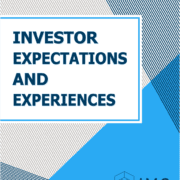How Using a CRM Can Help Firms Create a Winning Investor Experience
According to the National Association of Realtors, in the second quarter of 2016, the average commercial real estate transaction was valued at $1.4 million. With such a major investment at hand, investors expect to consistently have open, transparent communications with sponsors, as well as access to data and other important information regarding their transactions. The key to thriving in this type of environment and being able to meet these expectations lies in being proactive, and one of the best ways to do so is by leveraging technology.
A CRM, or Customer Relationship Management software, is vital in successfully managing investor relationships and providing investors with the type of experience that produces repeat investments. And with experience becoming a leading factor when making strategic business decisions by 2020, the need for a CRM is becoming even more dire for firms that want to build trusting, long-term relationships with investors.
Read ahead to learn how using a CRM can lead to improved client relationships and an enhanced investor experience.
Personalized Messaging
A one-size-fits-all approach where each of your investors or potential investors are engaged in the exact same manner is outdated. Today, personalization is the key to fully gaining investor’s loyalty. With a CRM platform, important information about each investor, such as asset type preferences, regional preferences, and investment criteria can be stored. These insights can then be used to develop a more customized approach for communicating with and engaging investors.
With a CRM, organizing and managing important contact information is also significantly easier. The amount of time saved by using this type of platform creates additional opportunities for crafting individual, relevant messages for investors. For example, email marketing with user segments can be incorporated to target subsets of contacts with common needs, wants, demands, behaviors, or characteristics.
Personalized messaging is even more important for winning over emerging investors’ loyalty, specifically the Millennial investor. While performance has traditionally been the key to attracting and retaining investors, emerging investors’ preferences are heavily centered around personalization. In fact, 70% of Millennials are reportedly frustrated with irrelevant marketing emails and instead prefer personalized communications. As this cohort begins to invest in and influence commercial real estate, a CRM will be undeniably useful in ensuring that they are properly engaged.
Streamlined Communications
It’s no secret that investors are busy. Often, they are balancing multiple existing investments, while seeking future opportunities. What this means is that their time is valuable, therefore treating it as such by streamlining communications is important.
By streamlining communications, firms are able to improve their efficiencies in the way that they interact and correspond with investors. CRM’s can keep track of everything from investor’s personal contact information to their activity history to even the content of conversations that have occurred. This means that important investor data will not be siloed amongst teams, providing opportunities for firms to more effectively assist investors.
An example of how a CRM can be used to streamline the communication process is by allowing sponsors to conveniently store and organize investors’ current and past transactions with a firm. Using this type of platform to store transaction history makes it easier to quickly identify best-fit investors for future investing opportunities. And with a CRM, like RealPage IMS, finding investors’ information can be done up to 76% quicker.
Automated Processes
When manual processes are eliminated, investors’ expectations are more easily met and even surpassed. Today, however, about 70% of CRE firms still use manual processes to manage their client relationships. The majority of these firms have encountered issues with inefficiencies and have client data that is scattered amongst people and locations.
Automated processes, including workflows and waterfall distributions, create more time for sponsors to focus on value-add activities that can enhance the investor experience. With workflows and waterfall distributions, spreadsheet-based risks are removed, meaning that investors can expect to consistently receive accurate distributions and statements.
Ultimately, in the midst of commercial real estate’s technological disruption, adapting to shifts in the industry by leveraging a CRM can be very valuable to both a firm and its investors.
Download the free checklist “7 Signs Your CRE Firm Needs a CRM” to learn more ways that a CRM can help drive efficiency and effectiveness for your firm.











